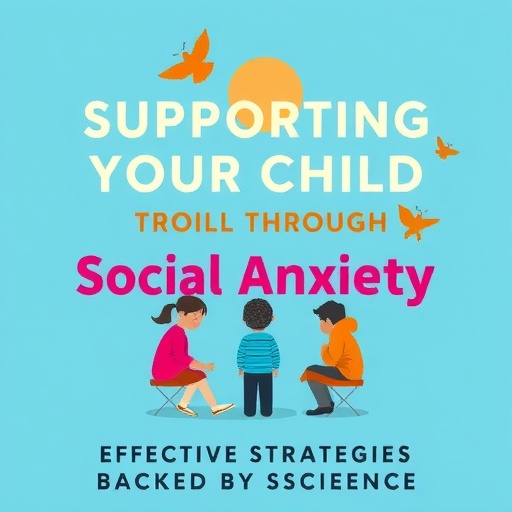Adolescence is a formative period marked by profound psychological and social changes, and it is during this critical phase that social anxiety frequently manifests or intensifies. A recent meta-analytic study from the University of Georgia sheds new light on the multifaceted role that both mothers and fathers play in shaping their children’s social anxiety symptoms. This research underscores the unique and equally significant contributions of each parent, emphasizing how their interactions can either alleviate or exacerbate social anxiety among adolescents.
The study methodically analyzed a broad range of existing literature that included parental influences from both genders, enabling a nuanced understanding of how warmth, acceptance, and controlling behaviors differentially impact adolescent social anxiety. By integrating findings across diverse cultural contexts and age groups within adolescence, the researchers provide compelling evidence that parental emotional climate is a pivotal factor in the development and severity of social anxiety symptoms.
One of the central revelations of this research is that parental expressions of warmth, affection, and acceptance are reliably associated with reductions in social anxiety symptoms among teens. This aligns with established psychological theories positing that emotionally supportive environments foster a child’s sense of security and self-worth, which are essential in managing social fears and inhibitions. Both mothers and fathers, through nurturing interactions, contribute significantly to building this protective buffer against anxiety.
Conversely, parental behaviors characterized by rejection, coldness, or emotional unavailability correlate strongly with elevated social anxiety symptoms. This pattern suggests that adolescents internalize negative parental cues as indicators of social threat or personal inadequacy, potentially heightening their apprehension in social contexts. The meta-analysis highlights that such detrimental parenting behaviors transcend cultural boundaries, reflecting a universal dynamic in parent-adolescent relationships.
Intriguingly, the meta-analysis also identifies distinct differences in how maternal and paternal controlling behaviors affect adolescents, with overly controlling mothers exerting a more pronounced impact on social anxiety symptoms compared to fathers. While the precise mechanisms remain ambiguous, one plausible interpretation offered by the lead researcher, Cullin Howard, relates to the disproportionate role mothers often assume in day-to-day caregiving. This increased engagement may render maternal control more salient and psychologically influential.
Controlling behaviors encompass a spectrum of actions, including guilt induction, unrealistic expectations, and overprotection, all of which can undermine adolescents’ autonomy and self-regulatory capacities. Excessive parental control is theorized to stifle the development of essential social-cognitive competencies, such as emotion regulation and resilience, thereby predisposing teens to heightened anxiety in social situations. The findings underscore the importance of differentiating between necessary parental guidance and detrimental overcontrol.
Nonetheless, the study cautions against oversimplifying parental control as inherently negative. Setting appropriate boundaries remains crucial in adolescent development, providing structure and safety while facilitating gradual independence. The equilibrium between offering freedom and enforcing limits is delicate; optimal parenting involves calibrating this balance to support the adolescent’s evolving autonomy without compromising oversight.
Fathers, often less scrutinized in family dynamics research, emerge in this study as vital contributors to adolescent social well-being. Encouraging, supportive, and engaged paternal behaviors are linked to positive outcomes, reinforcing the importance of father-child quality time. The father’s role, although distinct from the mother’s, is equally indispensable in fomenting social competence and emotional security.
The research methodology employed — a meta-analysis — offers robust statistical power by synthesizing data from multiple studies. This approach allows for greater generalizability of findings and the identification of overarching trends that may be obscured in individual studies. By focusing on perceived parenting rather than objective measures alone, the study captures adolescents’ subjective experiences, which are crucial determinants of social anxiety.
Importantly, the study’s implications extend beyond academic discourse to practical applications in mental health interventions and parenting programs. Therapeutic strategies aimed at reducing social anxiety in adolescents might benefit from involving both parents, addressing maladaptive control tactics and fostering an atmosphere of warmth and acceptance. Such family-centered approaches have the potential to produce more sustainable improvements in adolescent psychological health.
Finally, by revealing cultural universality in these parental effects, the study advocates for cross-cultural sensitivity in clinical and social policy frameworks. Whether in collectivistic or individualistic societies, the parental roles in mitigating or aggravating social anxiety resonate similarly, calling for global awareness in adolescent mental health strategies.
In sum, this comprehensive meta-analysis elucidates the significant yet nuanced roles that both mothers and fathers play in adolescent social anxiety trajectories. It promotes a paradigm shift towards recognizing co-parental responsibility and the critical need for balanced parenting — nurturing yet appropriately autonomous — to foster resilient, socially confident adolescents capable of navigating complex interpersonal environments.
Subject of Research: Parenting influences on adolescent social anxiety symptoms
Article Title: Perceived Mother and Father Parenting and Adolescent Social Anxiety Symptoms: A Meta-Analysis
News Publication Date: 24-Jul-2025
Web References:
https://link.springer.com/article/10.1007/s40894-025-00268-0
References:
Howard, C., Oshri, A., Card, N., Muñoz, M., Thomas, C., & Brown, G. (2025). Perceived Mother and Father Parenting and Adolescent Social Anxiety Symptoms: A Meta-Analysis. Adolescent Research Review. https://doi.org/10.1007/s40894-025-00268-0
Keywords: Social anxiety, adolescence, parenting, maternal control, paternal support, emotional development, autonomy, family dynamics, psychological well-being




